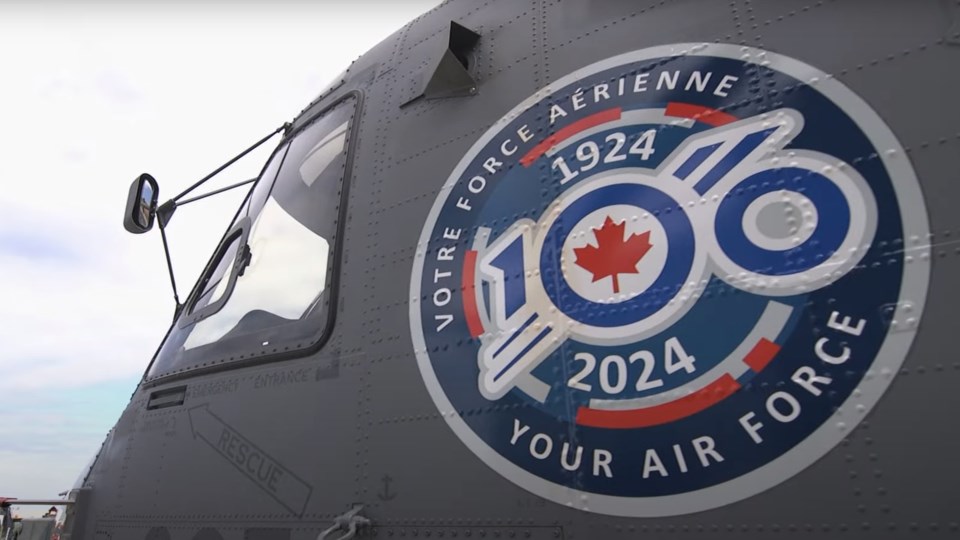MOOSE JAW — Filmmaker Robert (Bob) Barrett spent nearly two years making a documentary about the Royal Canadian Air Force’s history, and one thing he discovered was its personnel are high-calibre role models for their communities.
The Toronto-based documentarian began shooting “Wings of Honour: A Century of the Royal Canadian Air Force” in 2022, where he crisscrossed Canada interviewing more than 140 past and present veterans, including Canadian astronauts Jeremy Hansen and Chris Hadfield.
Moreover, he had access to thousands of hours of archival film featuring the air force, from its infancy to its significant contributions during the Second World War to its activities today.
The Mae Wilson Theatre showed the documentary recently as part of Moose Jaw’s efforts to celebrate the RCAF’s 100th anniversary. The film can be found at cpac.ca.
Barrett told MooseJawToday.com that he has had a relationship with the air force for years, after creating one project about the Avro Arrow and a trilogy of films about Canadian airmen in the First World War.
“I was so impressed with the calibre of its members (regardless of position),” he said.
The director approached the RCAF about five years ago and suggested that they help create a documentary about the service because of the “outstanding people” in it and the fact airmen “paid the price” with their lives during the Second World War. Fortuitously, the documentary came together for the 100th anniversary.
Barrett spent one-and-a-half years filming and interviewing people, while it took him eight months — beginning in the fall of 2023 — to cut the film.
“It was a long time coming, but it was a long dream of mine to make this a reality,” he stated. “They’re role models … . Members of the RCAF are all about community, and putting country and community above oneself (for 100 years) is admirable.”
The director thought it was “mind-blowing” to watch hours of archival film over many days and choose the best parts. Several national organizations let him access their vaults, including the air base at Trenton, Ont., which had 300 canisters of 16-millimetre black-and-white film that required a projector to play.
“It was incredible. It was so old school … ,” he said, noting he became emotional watching clips from the Second World War, knowing that more than 18,000 airmen died overseas.
Meanwhile, the director spoke with veterans of all ages, with the oldest being a 105-year-old World War II airman. He was impressed with the knowledge that the “old timers” had and passed down to younger generations, who then passed that wisdom to others through the decades.
Barrett had begun interviewing Second World War and Korean War veterans years before because they were starting to die off, so he also included that footage to ensure their stories were told.
“It’s an incredible legacy. It’s a great story of courage, determination and skill set,” he said, noting it was also great to film the “beautiful aircraft” and be around them.
One thing the director discovered is how humble everyone is, regardless of rank. Many veterans told him that they had a job to do and did it, while they were focused on saving lives and protecting the freedom of others — all while facing regular dangers.
In the early days of the North Atlantic Treaty Organization (NATO), many pilots died overseas because they trained daily. Barrett noted that flying low to the ground at Mach 2 — 2,385.36 kilometres per hour — is dangerous no matter where it occurred.
One veteran even told the filmmaker that he attended the funerals of 30 of his friends while in Europe, which was tough since many men left behind children.
Meanwhile, Barrett discovered that many airmen didn’t stop serving their communities after they retired, as some became commercial airline pilots, bankers, politicians or other industry leaders. He noted that they were always prepared to offer leadership, which many people appreciated.
Another fascinating fact was how many different roles the RCAF has beyond just pilots, as there are a “number of layers” to put airmen in the air. This includes personnel in training schools, educational institutions, maintenance, logistics and other roles that keep planes gassed up and ready for pilots.
“Remember, these people have lives and families. All that gets put on hold (when they respond to situations). No one knows what they’ll fly into,” Barrett said, noting some personnel spoke about rising at 3 a.m. for an incident and then returning home to see their kids off to school.
“It gets you right in the heart. I got emotional learning about their sacrifices,” he continued. “It really makes you humble. I left a lot of air bases feeling very proud to be Canadian and to work with them.”
Throughout 2023, Barrett flew in various aircraft over mountains, the oceans, the Far North and the Prairies while filming. He thought it was “the best summer” of his life because of the time he spent with “quality Canadians.”
“I’m really happy with how the film turned out,” Barrett added. “I (have) had a great response from the military and veterans … .”




